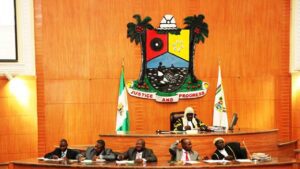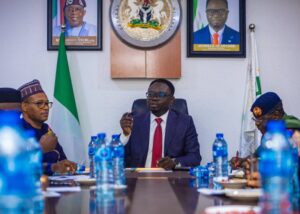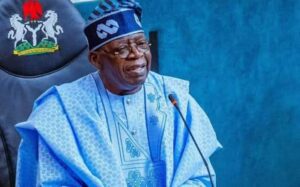
We’ll remove impediments to businesses, trade — Presidential committee
The Presidential Committee on Fiscal Policy and Tax Reform (PCFPTR), says it is working assiduously to remove impediments to businesses and trade in the country.
Chairman of the PCFPTR, Mr Taiwo Oyedele stated this while briefing State House Correspondents, shortly after the committee met with President Bola Tinubu, on Tuesday at the presidential villa, Abuja.
Oyedele explained that the committee was mandated by President Bola Tinubu to help reform the fiscal system and tax administration.
“The work we have been given to do has three pillars. One is fiscal governance and issues to do with fiscal policy coordination with monetary policy.
“It will highlight issues to do with respect to legal thresholds, and debt to GDP, debt service to revenue ratio, deficits in the budget as a ratio of GDP and many others.
“The second pillar is revenue transformation, which is where we are looking at both non-tax and tax revenues, including how to optimise value from government assets and natural resources.
“Also it will examine how we will gain more efficiency from government-owned enterprises so that they can yield returns for the Nigerian people.”
He said the third leg or pillar is to deal with economic growth facilitation.
“The principle behind this is that at the end of the day, the most sustainable way for any country to generate revenue is to grow the economy. When businesses succeed, when individuals prosper, they pay taxes. For us that’s the most fundamental.
“We are looking at how to remove impediments to businesses and trade, We will also look at opportunities for young Nigerians, many of whom are very smart and intelligent.
“But today, we have legal and tax impediments that will not allow global organisations to hire Nigerians in Nigeria to work within the global value system.
“We will remove those impediments so that people can then gain employment, earn dollars while they are here in Nigeria, which not only helps with our foreign exchange management, but ensures that people also have prosperity to lift themselves and families from poverty.
“And of course, they will pay taxes on the income to the government.”
He said that the committee created six subcommittees which meet every single day.
“The subcommittee meets every single day, and for us that’s the sense of urgency in dealing with issues that are affecting our country.
“Because the President was busy outside the country, we did not submit our report exactly when it was ready.
“What we have done since then was to start speaking to the various policymakers, from the Central Bank of Nigeria to the Finance Minister, who is also the Coordinating Minister for the Economy, to the Federal Inland Revenue Service (FIRS) and the Joint Tax Board, and even two state governors.”
He stated that the committee held sessions with the Senate, noting that it had been actively engaging with various key stakeholders trying to put the framework in place for implementing its recommendations.
“All we did today was to formally present the report to Mr President, but I will say that once we get the nod from him, it will be like just switching on the tap and then the implementation starts immediately.
“There’s so much work for us to do, this is just Milestone #1, it is what we call the quick wins. The second phase, which is where we are now, is the critical reforms.
“Those critical reforms involve even rewriting our major tax laws, addressing something that everybody in this room will be very much familiar with multiplicity of taxes.”
He said that there are over 60 taxes and levies, officially collectable by the Federal, State and Local Governments.
“Unofficially, those taxes are over 200, making life difficult for our people. So the objective we have, and that’s what we’re working towards, is to bring all of that to a single digit.
“The taxes at all levels of government combined, should be less than 10 because about 96 percent or more of our revenue across Federal, State and Local governments, currently is generated from less than 10 taxes.
“And we have seen countries like South Africa generating more than our entire national tax revenues from just one tax.”



